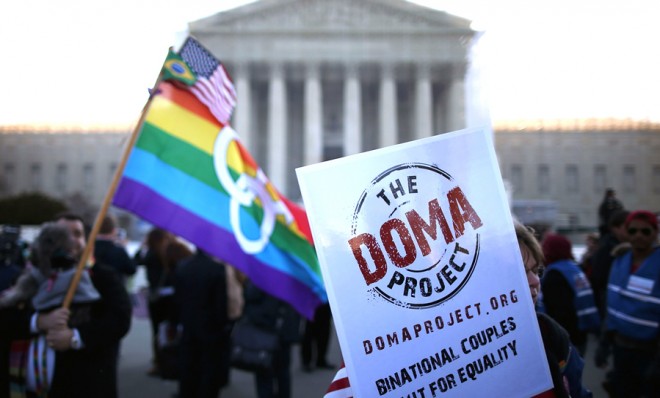The Supreme Court and gay marriage: Why DOMA may be doomed
A majority of justices expressed skepticism about the Defense of Marriage Act's constitutionality


A free daily email with the biggest news stories of the day – and the best features from TheWeek.com
You are now subscribed
Your newsletter sign-up was successful
On Wednesday, the Supreme Court heard the second of two gay-marriage cases scheduled for oral arguments this week, this time focusing on the constitutionality of the 1996 Defense of Marriage Act, which defines marriage as being between a man and a woman. How the court will rule in yesterday's case, which centered on California's Proposition 8 ban on gay marriages, remains something of a mystery. Today's case was more clear-cut: A majority of justices voiced strong skepticism of DOMA's constitutionality.
At issue is a portion of the law that prevents the government from providing same-sex couples with the usual benefits that come with marriage. The case had originally been brought by Edith Windsor, 83, who had married Thea Spyer in Canada in 2007. When Spyer died in 2009, Windsor was bequeathed Spyer's estate in New York, but since their marriage was not recognized by the federal government, Windsor was forced to pay a $360,000 estate tax bill that would not have applied if she had been part of a heterosexual marriage.
The Supreme Court's four liberals argued that DOMA effectively created two unequal classes of married couples, which would be a violation of the Constitution's equal protections clause. "There are two kinds of marriage," Justice Ruth Bader Ginsburg said. "Full marriage and skim-milk marriage."
The Week
Escape your echo chamber. Get the facts behind the news, plus analysis from multiple perspectives.

Sign up for The Week's Free Newsletters
From our morning news briefing to a weekly Good News Newsletter, get the best of The Week delivered directly to your inbox.
From our morning news briefing to a weekly Good News Newsletter, get the best of The Week delivered directly to your inbox.
Justice Anthony Kennedy, who is widely considered the swing vote in both cases before the court, appeared to side with the liberals — though for different reasons. Kennedy argued that the federal government was imposing its definition of marriage on the states, particularly those where same-sex marriage is legal, which he suggested was a violation of state sovereignty.
The definition of marriage has always been the purview of the states, Kennedy said. Furthermore, he suggested DOMA's definition of marriage had become too "intertwined with daily life," given the fact that marriage is referred to more than 1,000 times in the federal code.
Paul Clement, the lawyer tapped by House Republicans to defend DOMA, argued that the law had been enacted to ensure uniformity in the code, so that states where gay marriage is still illegal would not be forced to recognize a "redefinition of an age-old institution." Kennedy, however, rejected the uniformity argument, saying it was clear the law made two distinct classes of marriage.
With five justices appearing to line up against DOMA, analysts swiftly issued predictions. "That law may be gone, after a 17-year existence," wrote Lyle Denniston at SCOTUSblog.
A free daily email with the biggest news stories of the day – and the best features from TheWeek.com
Windsor herself was quite upbeat. "I think it went beautifully," she told reporters after the oral arguments. "I felt we were very respected, and I think it's going to be good."
The Obama administration has chosen not to defend DOMA in court, arguing that it is unconstitutional (that is why the GOP-controlled House had to step in to defend the law). However, the Obama administration also continues to enforce DOMA as the law of the land.
In other words, the Obama administration "agrees with Ms. Windsor that the law is unconstitutional," writes Adam Liptak at The New York Times, "but will not pay her the tax refund she seeks."
Chief Justice John Roberts was frustrated that the court had to deal with the case at all. "I don't see why [Obama] doesn't have the courage of his convictions," he said, referring to the White House's decision to continue enforcing the law.
Furthermore, while a lower court had struck down the provision in question as unconstitutional, the Obama administration appealed the case to the Supreme Court anyway, saying it wanted the highest court in the land to rule that it was unconstitutional.
"This is wholly unprecedented," said Justice Antonin Scalia. "You're asking us to do something we've never done before to reach this case."
There is a chance that the court will rule that the Obama administration did not have standing to appeal in the first place. Indeed, the court invited Vicki Jackson, a law professor at Harvard, to a separate session to make just that argument. She told the justices to "await another case, another day," before deciding the constitutional merits of DOMA.
So: While a majority of the court seems to oppose DOMA, the justices might still throw out the case on a bizarre technicality.
Ryu Spaeth is deputy editor at TheWeek.com. Follow him on Twitter.
-
 The 8 best TV shows of the 1960s
The 8 best TV shows of the 1960sThe standout shows of this decade take viewers from outer space to the Wild West
-
 Microdramas are booming
Microdramas are boomingUnder the radar Scroll to watch a whole movie
-
 The Olympic timekeepers keeping the Games on track
The Olympic timekeepers keeping the Games on trackUnder the Radar Swiss watchmaking giant Omega has been at the finish line of every Olympic Games for nearly 100 years